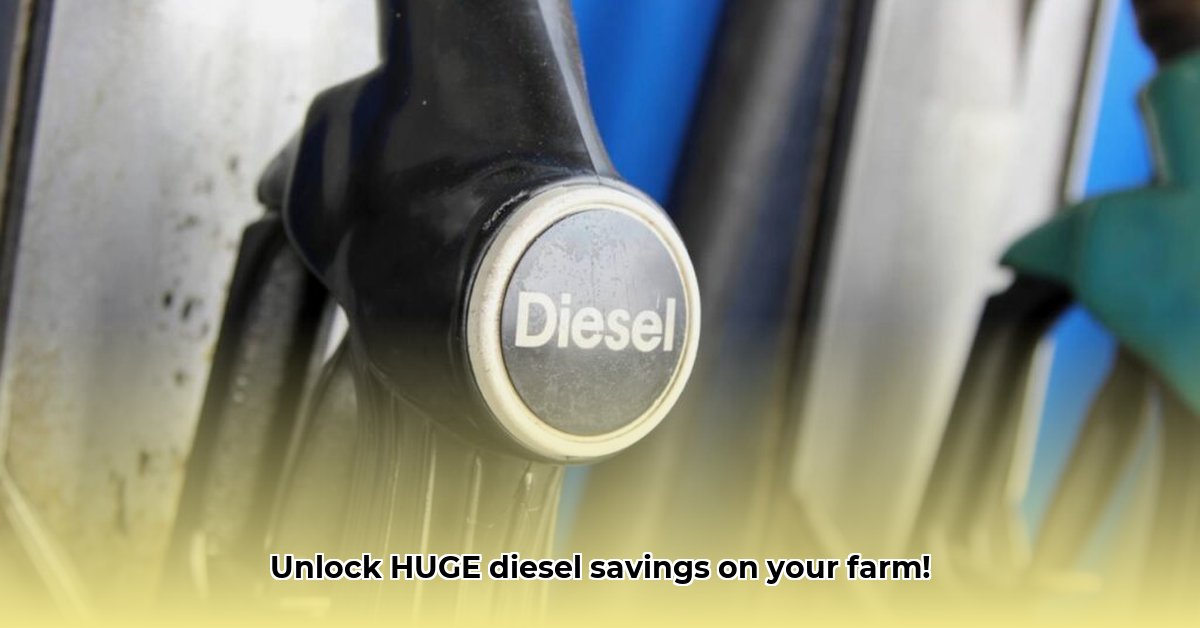
Tractor Diesel Fuel: Smart Strategies to Slash Your Fuel Bills
Farming is a tough business, and fuel costs significantly impact profitability. This guide provides actionable steps to reduce diesel expenses without compromising farm productivity. We'll cover fuel types, seasonal strategies, and practical techniques to maximize your fuel efficiency. Did you know that even small changes in your fueling practices can translate to significant savings over the course of a year? For more in-depth information, check out this comprehensive guide.
Understanding Your Fuel Choices: Tractor Diesel vs. Reefer Fuel
Let's clarify the critical difference between tractor diesel fuel (for on-road use) and reefer fuel (for refrigerated trailers, typically off-road use). While both are diesel, they are not interchangeable. Reefer fuel often costs less due to lower taxation, but using it in your tractor is illegal and carries hefty fines—potentially thousands of dollars. Always use only the appropriate fuel type for your equipment.
The Price Game: Quantifying Potential Savings
The price difference between reefer fuel and tractor diesel can be substantial, particularly with high fuel consumption. The potential savings can amount to hundreds, even thousands, of dollars annually, depending on your fuel usage. However, remember that the allure of cheaper fuel shouldn't lead to illegal practices. Authorities use dye markers to easily identify the misuse of off-road diesel fuel.
Seasonal Fuel Strategies: Adapting to Weather Conditions
Diesel fuel's properties change with temperature. Summer blends may thicken or even gel in freezing temperatures, damaging your equipment. Winter blends are formulated to prevent this. Choosing the correct blend for the season is essential for both your tractor and refrigeration units. While reefer fuel typically handles cold better, using the wrong type can still lead to significant problems.
A Step-by-Step Guide to Lowering Your Fuel Costs
Follow these six steps to optimize your diesel fuel budget:
Meticulous Fuel Usage Tracking: Monitor your fuel consumption closely. Identify periods of peak fuel use to pinpoint areas for potential savings. Many farmers effectively utilize spreadsheets, notebooks, or dedicated farm management software for accurate tracking.
Prioritize Regular Tractor Maintenance: Regular maintenance is crucial for fuel efficiency. A well-maintained tractor operates more efficiently, consuming less fuel. Neglecting maintenance is akin to throwing money away. Essential maintenance tasks include regular oil changes, filter replacements, and tire pressure checks.
Implement Fuel-Efficient Driving Techniques: Avoid unnecessary idling. Plan routes efficiently to minimize travel time and fuel usage. Employ smooth driving techniques by avoiding harsh acceleration and braking. Train your operators in fuel-efficient driving practices for maximum impact.
Bulk Fuel Purchasing (When Strategic): Purchasing fuel in bulk may result in a lower price per gallon. However, ensure you have sufficient, properly maintained storage to prevent fuel spoilage. Consider the storage costs and potential risks before committing to bulk purchases.
Fuel Additives: A Cautious Approach: Some fuel additives claim to improve fuel efficiency. Always consult your equipment manual and thoroughly research any additive before use. Not all additives are equally effective or safe for your equipment.
Explore Alternative Fuels: A Long-Term Perspective: Biofuels represent a continually evolving area of research, potentially offering sustainable and cost-effective alternatives. However, their current availability and infrastructure are still developing. Stay informed about this sector's progress.
Managing the Risks: Protecting Your Investment
Here's a risk assessment matrix detailing potential problems and their mitigation strategies:
| Risk | Probability | Impact | Mitigation |
|---|---|---|---|
| Illegal Reefer Fuel Use | High | Significant fines, legal issues | Use only approved diesel fuel. Never use reefer fuel in on-road equipment. |
| Fuel Storage Issues | Moderate | Contaminated fuel, equipment damage | Maintain clean, sealed tanks; regular leak inspections are vital. |
| Poor Fuel Quality | Moderate | Equipment malfunction | Select fuel from reputable suppliers who prioritize quality control. |
How to Avoid Hefty Fines Using Reefer Fuel in Agricultural Machinery
This section addresses the critical issue of using the incorrect fuel type – specifically, the misuse of off-road (reefer) diesel in on-road vehicles – and the potential for substantial fines.
"Using the wrong fuel type can result in severe penalties," says Dr. Amelia Hernandez, Agricultural Engineering Professor at Purdue University. "Strict adherence to fueling protocols is crucial for legal compliance and equipment protection."
Avoiding Fines: A Step-by-Step Guide
Clear Fuel Tank Labeling: Clearly label all fuel tanks (tractor fuel and reefer fuel) using contrasting colors and clear signage to prevent accidental misuse.
Formal Fueling Protocols: Establish a detailed procedure for identifying fuel types, using correct nozzles, and documenting each fueling event.
Regular Tank Inspections: Conduct routine inspections to detect cross-contamination or leaks promptly, preventing larger issues.
Thorough Driver Training: Provide mandatory, recurring training to all operators on fuel identification, proper procedures, and consequences of misuse.
Comprehensive Fuel Records: Maintain meticulous records of all purchases and usage for audits or investigations.
Stay Updated on Regulations: Regularly review changes to EPA regulations and state-specific fuel requirements.
Risk Mitigation and Legal Consequences
Proactive measures are vital. These include investing in fuel management systems, separate fuel storage, and an effective reporting system for any anomalies. Consequences of non-compliance include high fines, legal action, and potential equipment damage.
Key Takeaways:
- Fuel Type Differentiation: Understand the distinct differences between on-road and off-road diesel fuels to avoid legal and financial penalties.
- Fuel Selection is Critical: Proper fuel type is crucial for both equipment longevity and legal compliance.
- Stringent Fueling Protocols: Implement and maintain detailed fuel protocols to ensure correct usage. This includes rigorous training for all personnel and a strong emphasis on record-keeping.
- Regulatory Awareness: Stay informed on current and evolving fuel regulations to ensure ongoing compliance.
Remember, responsible fuel management directly contributes to a more profitable and sustainable farming operation. Every drop saved adds to your farm's bottom line.